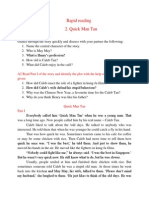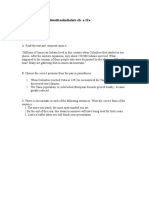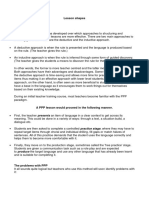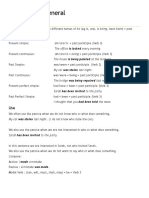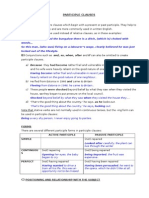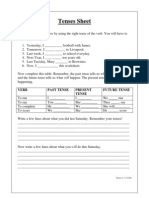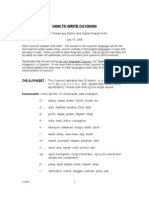Professional Documents
Culture Documents
The Subjunctive Mood
The Subjunctive Mood
Uploaded by
MocanuCristinaOriginal Description:
Copyright
Available Formats
Share this document
Did you find this document useful?
Is this content inappropriate?
Report this DocumentCopyright:
Available Formats
The Subjunctive Mood
The Subjunctive Mood
Uploaded by
MocanuCristinaCopyright:
Available Formats
THE SUBJUNCTIVE MOOD 10.05.
2011
Identifying the Structure
The subjunctive as a heterogeneous mood.
Answer: there are three ways in which a subjunctive form can be identified:
a) by looking at the context in which it appears: for instance, in the case of (1) the main verb
wish should warn you that a subjunctive form is required to complete it
b) by looking at the meaning of the structure: if it has a hypothetical meaning, it probably is
a subjunctive
c) by translating it: if it can be translated through a conjunctive/conditional form in
Romanian, then it is likely to be a subjunctive (the other option is ‘conditional’, but the
Conditional is easily identified in English)
Subjunctive/Indicative
A sentence in the subjunctive represents a possible, non-factual state of affairs.
(Stefanescu 500).
The indicative is factual and occurs in statements that provide a (true or false)
representation of the world; the subjunctive mood is theoretical, it commends that
certain states of affairs are (or are not) desirable (Stefanescu 500)
THE INDICATIVE THE SUBJUNCTIVE MOOD
MOOD
• 16 tenses • 2 tenses (present and perfect)
• descriptive • prescriptive
• factual • hypothetical, counterfactual
! The sequence of tenses operates only within the Indicative. There are
no ‘sequence of tenses’ phenomena between the Indicative and other
moods !
Test: Indirect Speech instances
DS: Anne: I want to go home. DS: Anne: I wish I had more money.
(Present Simple) (Present Subjunctive)
IS: Anne told Bill she wanted IS: Anne told Bill she wished she had
to go home. (Past Simple) more money. (Present Subjunctive)
DS: Anne: If you gave me your book, I
would lend you my bike. (Present
Subjunctive, Present Conditional)
IS: Anne told Bill she would lend him
her bike if he gave her his book.
(Present Conditional, Present
Subjunctive)
Philosophers of language distinguish between assertion and non-assertion. According to them,
to assert is to present the hearer with a representation of the world to which, the speaker
believes, the hearer has no access. Assertions and pointing gestures do not differ in a
fundamental way. In assertions, language is said to be used informatively. (Stefanescu 501)
Non-assertions do not provide representations of current states of affairs, instead, they are
commendations or commands that a certain state of affairs obtains; they command or
commend possible courses that events should take at a time after now. Non-assertions don’t
blong to the informative use of language but to a prescriptive use.
The prescriptive use of language: imperative and subjunctive sentences
The indicative – the deictic category of tense
The subjunctive mood- lacks deictic temporal orientation
The Synthetic/Analytic Opposition
SYNTHETIC ANALYTIC STRUCTURES
STRUCTURES (grammatical information is
(fusion between main item carried by a separate lexical
and the grammatical item)
information)
Subjunctive: I wish I went Subjunctive: I wish it would
to the party. rain.
Comparative: bigger/est
than him Comparative: more
interesting than him
Genitive: Susan’s, father’s Genitive: the complete works
car of Shakespeare
THE SUBJUNCTIVE
THE ‘SYNTHETIC’ THE ‘ANALYTIC’
SUBJUNCTIVE SUBJUNCTIVE
Old New
Present: should/could/may/might
play
E.g. It’s odd that they should play
Present: Present: chess so well when they are so
play played young.
E.g. Long live I wish I played
the queen! chess with you. (I
I’d rather play might.)
chess than stay
here. (I might)
Perfect*: should/could/may/might
Perfect*: have have
played played
E.g. I’d rather E.g. It’s odd that they should have
have played played chess so well last week.
chess with
Susie when she
visited us (why
didn’t I?) Perfect: had
played
I wish I had
played chess with
you (why didn’t
I?)
! The star (*) indicates that the form is infrequently used in English.
The Synthetic Subjunctive
CONTEXTS FOR THE SYNTHETIC SUBJUNCTIVE
Old New
In independent sentences: Independent sentences:
Long live the Queen. Come Oh, had I wings!
what may, So be it, Grammar If only I had known!
be hanged, Damn him, Far be it
from me…
In subordinate clauses: Subordinate clauses:
• after would rather (the • after if **and any other item
same subject for main and containing ‘if’ (if only, suppose,
subordinate clauses) supposing, what if, as if/though,
I’d rather tell you about it./I’d even if/though, say, as long as,
rather have told you about it. unless):
If Bill got married, he would be
• after had better miserable./ If Bill had got married, he
You’d better tell her about it./ would have been miserable.
You’d better have told her • after wish/ it’s time/would
about it*. rather
I would rather you went there/ I
• after verbs of command, would rather you had gone there.
wish (exercitive, bulomaic, (here the subject of the main clause is
emotive) not the same as the subject of the
It is important that he behave subordinate).
himself.
! The star (*) indicates that the perfect form is infrequently used in
English.
** All these elements can also be followed by Present simple (but with
a different shade of meaning):
E.g. If you go there, I will be very disappointed. / He behaves as if
he loves her.
The Analytic Subjunctive
CONTEXTS FOR THE ANALYTIC
SUBJUNCTIVE
Independent sentences Subordinate clauses
May you live long and have a • In that clauses after certain
beautiful life. verbs:
May he be happy for as long 1. Exercitive verbs: ask (require),
as he lives. demand, forbid, order, pray,
press, recommend, suggest,
propose, supplicate, urge, give
orders
An exortation that a certain state of
affairs comes into being:
He has given the order that the
patient should have a bath every
day.
Dan insisted that she should date
him.
2. Bulomaic verbs: want, wish,
hope, desire
Commendations that certain
situations should be brought about.
I wish you would stop bothering
me.
I desire that you should do your
duty.
3. Emotive verbs: after copula +
evaluative adjectives:
It is advisable/ important/good that
he should meet his teacher soon.
• after purpose/sequence
introductory items: so that,
so… that, in order that, lest*,
for fear that, in case
I hid the secret from him for fear/in
case he might want to use it against
her.
• after concessive introductory
items**: no matter,
how/whatever, as etc.:
Now matter how much he might
know about her, she still won’t
listen to him.
Smart as he may be, he still can’t
read.
Try as I might, I couldn’t uncork
the bottle.
* this introductory item is obsolete, no longer used
** all these items can also be followed by an indicative form, with
a slightly different meaning (the speaker assumes that the action of
the subordinate is accomplished)
Compare: Smart as he is, I still don’t like him. vs. Smart as he may
be, I still don’t like him. (In the first case, I assume he is indeed
smart).
THE SUBJUNCTIVE MOOD
1. Identify the instances of subjunctive mood and state their type:
1. Let him suffer as I suffered before him. 2. Had I done what you had asked me, I would have
been in grievous danger. 3. You’d better listen to your elders. 4. Suffice it to say that I found
myself in a pretty desperate situation. 5. It is essential that you should be with your own family. 6.
He bought me a horse so that I might learn how to ride. 6. If only you weren’t so mean! 7. They
were talking to him as if he were their underbutler. 8. I’d rather you didn’t turn on the lights. 9.
They insisted I clean the house again. 10. I am watching the building lest a burglar should break
in.
2. Translate the following sentences into English:
Să te ajute Cel- de- Sus! Să te ierte Dumnezeu! Da- r- ar ciuma-n el! Să- l ia naiba! La naiba cu
gramatica! Vie împărăţia ta, facă- se voia ta! Să fie fericit în viaţa pe care şi-a ales-o. Blestemat să
fie cel care te-a adus în starea asta! Oh, de- ar fi aici să te vadă victorios! Trăiască regele! De-ar fi
vrut Dumnezeu să izbândească. Numai de-ar fi ştiut. E de ajuns să menţionez că omul e
nevionovat. Când te gândeşti că eram milionar pe timpuri. Departe de mine gandul să le stric
petrecerea. Să câştige cel mai bun dintre noi. Să trăieşti mult şi să de bucuri de ea. Să se ştie că de
azi înainte nu vom mai tolera o asemenea comportare. Nu vorbiţi toţi odată. Să se ducă cineva să-
mi aducă o lumânare. De n- ar fi aşa încăpăţânată. Să vorbească Maria acum. Noi să uităm
trecutul. Ascultă, băiete, ce-ar fi să terminăm lucrarea asta înainte de a pierde clientul, ce zici?
3. Finish the following sentences without changing the meaning of the sentence printed
before them:
1. He regrets not seeing that movie. / He wishes...
2. Why did you answer so rudely? / I’d rather you...
3. I would like you to go there and apologize. / I wish…
4. How could you tell such a thing to your boss? / I’d rather you...
5. Why did you strike that man, were you out of your mind? / I wish...
6. I wish I hadn’t laid the table before they arrived. / I’d rather...
7. She complained that she had to work so hard. / “I wish....
8. Why did she have to lie there and say nothing in her defense? / If only...
9. You shouldn’t have made that mistake! / I’d rather....
10. I am so embarrassed at the thought of meeting him again! / Suppose...
11. Why did you have to insult him? / You’d better...
12. He won’t like it if you lie to him! / He’d rather...
13. It would have been better not to meet her at all. / I’d better...
14. Why did you beat him? / I’d rather you...
15. I wish you told them the truth. / They’d better...
16. Why didn’t you inform me earlier? / I’d rather...
17. Please, be on time. / You had....
18. I thought you would flee when he attacked you! / I wish you...
19. What a pity she didn’t wear her new dress at the party! / She’d rather...
20. You should not have informed them about it. / They’d rather not...
You might also like
- Jolly Phonics Grammar 4 Handbook PreviewDocument2 pagesJolly Phonics Grammar 4 Handbook Previewbookwormj50% (16)
- English Corner 3 Lesson PlansDocument32 pagesEnglish Corner 3 Lesson PlansMartha Angelica de Alba100% (1)
- English Teaching MaterialDocument4 pagesEnglish Teaching Materialrafanrin9783No ratings yet
- Exercitii Present Simple and ContinuousDocument6 pagesExercitii Present Simple and ContinuousAndreea Andrutz0% (1)
- Cambridge English Assessing Writing Performance at Level b1 PDFDocument26 pagesCambridge English Assessing Writing Performance at Level b1 PDFscorbagNo ratings yet
- Subject Verb AgreementDocument30 pagesSubject Verb Agreementblossom buenaventura100% (1)
- As If and As ThoughDocument2 pagesAs If and As ThoughGurpal Vehniwal100% (1)
- Functionalism and Formalism in LinguisticsDocument416 pagesFunctionalism and Formalism in LinguisticsBia Corrêa100% (4)
- Past Simple LESSON - PLANDocument7 pagesPast Simple LESSON - PLANMilena MilchovaNo ratings yet
- PET - Writing Part 2Document4 pagesPET - Writing Part 2Camilo MoraNo ratings yet
- Present Perfect & Present Perfect Continuous Tenses: Dr. Pauline GhengheshDocument13 pagesPresent Perfect & Present Perfect Continuous Tenses: Dr. Pauline Ghengheshzak100% (1)
- English Course BookDocument59 pagesEnglish Course BookFrancisco PlazaolaNo ratings yet
- Past Subjunctive: Uses 1. Wish Were Wishes CouldDocument4 pagesPast Subjunctive: Uses 1. Wish Were Wishes Couldsilena medinaNo ratings yet
- IELTS Grammar GuideDocument29 pagesIELTS Grammar GuidePradeep PaudelNo ratings yet
- Imperative Sentences and Optative Lines English Practice Example Sentences Exercise 6......Document19 pagesImperative Sentences and Optative Lines English Practice Example Sentences Exercise 6......Abdul QadirNo ratings yet
- The Sequence of TensesDocument1 pageThe Sequence of Tensesmidnight's childNo ratings yet
- Filipino Grammar For The Beginning Learner: Appendix 4Document17 pagesFilipino Grammar For The Beginning Learner: Appendix 4Charissa Kate Montenegro100% (1)
- Realia As A Cultural PhenomenonDocument7 pagesRealia As A Cultural PhenomenonVenhrenovych Maiia100% (2)
- 9.1. Rapid Reading - 2. Quick Man TanDocument6 pages9.1. Rapid Reading - 2. Quick Man TanSaahil Ledwani100% (3)
- Verbs, Adverbs and PrepositionDocument6 pagesVerbs, Adverbs and Prepositionjoy05.alexa.01No ratings yet
- Genitive Case Main Concepts and Semantic UsesDocument11 pagesGenitive Case Main Concepts and Semantic UsesEmmett Young100% (1)
- Conditional BingoDocument1 pageConditional BingophillyfelipeNo ratings yet
- PrepositionsDocument11 pagesPrepositionssiddugoelNo ratings yet
- Relative Clauses and Reduced Relative ClausesDocument5 pagesRelative Clauses and Reduced Relative ClausesMARGARITA DE LA PEÑANo ratings yet
- Classification of Verbs in EnglishDocument24 pagesClassification of Verbs in EnglishCandelaria LuqueNo ratings yet
- Direct and IndirectDocument37 pagesDirect and IndirectKanoshikita ShimoarikuNo ratings yet
- Modal Auxiliary Verbs Chart: Yesenia Guadalupe Maas BaltazarDocument2 pagesModal Auxiliary Verbs Chart: Yesenia Guadalupe Maas BaltazarYesenia Guadalupe Maas BaltazarNo ratings yet
- B1 Extra Tasks For Early Finishers 1Document1 pageB1 Extra Tasks For Early Finishers 1hasimah5768No ratings yet
- Describing Pictures - FCEDocument1 pageDescribing Pictures - FCEÍtalo CoutinhoNo ratings yet
- Clasa A Viia Varianta ADocument5 pagesClasa A Viia Varianta AStefaniaNo ratings yet
- Usage of Dative Cases in HindiDocument2 pagesUsage of Dative Cases in HindiShreyaNo ratings yet
- Culegere Complex Sentence - LitereDocument125 pagesCulegere Complex Sentence - LitereDilek Mustafa0% (1)
- Difference Between Can and Could (With Comparison Chart) - Key DifferencesDocument5 pagesDifference Between Can and Could (With Comparison Chart) - Key Differences2cNo ratings yet
- CausativeDocument10 pagesCausativeFabiana JulioNo ratings yet
- Subiecte Situatii Neincheiate-Cls. A 12aDocument6 pagesSubiecte Situatii Neincheiate-Cls. A 12aAlina PoenaruNo ratings yet
- Course Content A1-BusinessDocument28 pagesCourse Content A1-BusinessYerai Sanchez MartinNo ratings yet
- Perfect Tense: From Wikipedia, The Free EncyclopediaDocument4 pagesPerfect Tense: From Wikipedia, The Free EncyclopediaDa PikemanNo ratings yet
- Relative Clauses - Fil in The Blanks 2Document1 pageRelative Clauses - Fil in The Blanks 2Natalia Soledad RojasNo ratings yet
- English Syntax: The PredicateDocument11 pagesEnglish Syntax: The PredicateJulianna BorbelyNo ratings yet
- Cleft SentencesDocument10 pagesCleft SentencesViko Arizabalux100% (1)
- Lesson ShapesDocument7 pagesLesson ShapesFrancesca MortaraNo ratings yet
- Passive VoiceDocument3 pagesPassive VoiceAbrar SmektwoNo ratings yet
- Unit 1 Types of Words and Word Formation ProcessesDocument23 pagesUnit 1 Types of Words and Word Formation ProcessesAhmed El-SaadanyNo ratings yet
- Adverbial SDocument8 pagesAdverbial SLê TràNo ratings yet
- Lesson Plan 10Document5 pagesLesson Plan 10Silviana SuciuNo ratings yet
- The Learner Language or InterlanguageDocument3 pagesThe Learner Language or InterlanguageIsabel Duarte OjedaNo ratings yet
- STATE Vs Dynamic VerbsDocument5 pagesSTATE Vs Dynamic Verbsornela100% (1)
- 12 Infinitive and GerundDocument3 pages12 Infinitive and GerundvijayaraghavnNo ratings yet
- The Working Day British English Student BWDocument6 pagesThe Working Day British English Student BWVeronicaNo ratings yet
- Past Simple Vs Continuous British English Student Ver2Document3 pagesPast Simple Vs Continuous British English Student Ver2Tehea MHNo ratings yet
- Future With Will and Going ToDocument6 pagesFuture With Will and Going ToSidi AMADOUNo ratings yet
- List of Prepositional PhrasesDocument7 pagesList of Prepositional PhrasesAarajita Parin100% (1)
- B. Past: The Subjunctive A. PrezentDocument2 pagesB. Past: The Subjunctive A. PrezentAlexandru Ionut MihaiNo ratings yet
- Advanced Conditionals ExplainedDocument11 pagesAdvanced Conditionals ExplainedGeorge PetreNo ratings yet
- Using Verb TensesDocument5 pagesUsing Verb TensesklipordNo ratings yet
- Limba EnglezaDocument61 pagesLimba Englezapluci09No ratings yet
- Subjunctive MoodDocument10 pagesSubjunctive MoodAdil YaradNo ratings yet
- The Subjunctive MoodDocument10 pagesThe Subjunctive MoodpatykcNo ratings yet
- Capitolul I Corectat FinalDocument50 pagesCapitolul I Corectat FinalAgentia Imobiliara Interest0% (1)
- Participle Clauses PDFDocument8 pagesParticiple Clauses PDFHanifah Herlini100% (1)
- Participle Clauses (English)Document3 pagesParticiple Clauses (English)schrodinguer1No ratings yet
- Understanding Tagalog Verbs PDFDocument6 pagesUnderstanding Tagalog Verbs PDFJhao IbayNo ratings yet
- ModalityDocument6 pagesModalitylizNo ratings yet
- Present Past and FutureDocument13 pagesPresent Past and FutureClaudia Nicoleta ComanNo ratings yet
- Types of VerbsDocument2 pagesTypes of VerbsmaheshradeNo ratings yet
- Language II Module 4 Subjunctive Mood With NumbersDocument23 pagesLanguage II Module 4 Subjunctive Mood With NumbersCostas NovusNo ratings yet
- What Someone Does Board GameDocument3 pagesWhat Someone Does Board GameNataNo ratings yet
- Tenses Sheet: Verb Past Tense Present Tense Future TenseDocument3 pagesTenses Sheet: Verb Past Tense Present Tense Future TenseAbdullah_Sadda_3889No ratings yet
- Simple PresentDocument6 pagesSimple PresentizaqueNo ratings yet
- ARTICLE NOTES ExampdfnotesDocument9 pagesARTICLE NOTES ExampdfnotesAbhijeet JhankalNo ratings yet
- Screen Was Broken: Where We Spent Our Summer HolidayDocument5 pagesScreen Was Broken: Where We Spent Our Summer HolidayDaniel GarcíaNo ratings yet
- Tag QuestionsDocument3 pagesTag QuestionsyamaaraaNo ratings yet
- 1st Periodic TestDocument16 pages1st Periodic TestJonabel ColopanoNo ratings yet
- Ready For Use of English Grammar: Some, Any, Much, Many, Little, Few, and A LotDocument3 pagesReady For Use of English Grammar: Some, Any, Much, Many, Little, Few, and A LotTierradelSurNo ratings yet
- Quiz Irregular Verbs Past ParticipleDocument1 pageQuiz Irregular Verbs Past ParticipleAndrea Marcela Mendez SanchezNo ratings yet
- The Conditional: Je Voudrais/J'AimeraisDocument1 pageThe Conditional: Je Voudrais/J'AimeraisharrybaggaleyNo ratings yet
- Animal StoryDocument60 pagesAnimal StorychalimacNo ratings yet
- English Answer Key Grade 4 PDFDocument4 pagesEnglish Answer Key Grade 4 PDFSoma BiswasNo ratings yet
- Sentence TypesDocument6 pagesSentence TypesBrian CastilloNo ratings yet
- Sanskrit-Verbless Sentences in SanskritDocument30 pagesSanskrit-Verbless Sentences in SanskritSundar Balakrishnan100% (1)
- Gramma IDocument49 pagesGramma ITesfu HettoNo ratings yet
- 2.1 Present Continuous: - FormDocument7 pages2.1 Present Continuous: - FormYosthyn Stalyn Lazaro AcuñaNo ratings yet
- English Sentence StructureDocument9 pagesEnglish Sentence Structurekeramatboy88No ratings yet
- Living in The Past (Test)Document3 pagesLiving in The Past (Test)Mónica SeabraNo ratings yet
- Class Notes - Documentos de Google LinwiDocument15 pagesClass Notes - Documentos de Google LinwiOviedo RocíoNo ratings yet
- Distributivity in Ellipsis in Chinese: Grant Xiaoguang LiDocument13 pagesDistributivity in Ellipsis in Chinese: Grant Xiaoguang LiWin certoNo ratings yet
- Voice ChangeDocument16 pagesVoice Changeskylarktheenglishclub2No ratings yet
- Workbook Kids Level 3Document8 pagesWorkbook Kids Level 3karenr.melgarlazaroNo ratings yet
- Write Cuyonon, July 15, 2008Document10 pagesWrite Cuyonon, July 15, 2008timbancaya5967100% (1)
- Grammar Reference LongmanDocument9 pagesGrammar Reference LongmanAndreia LourençoNo ratings yet


















